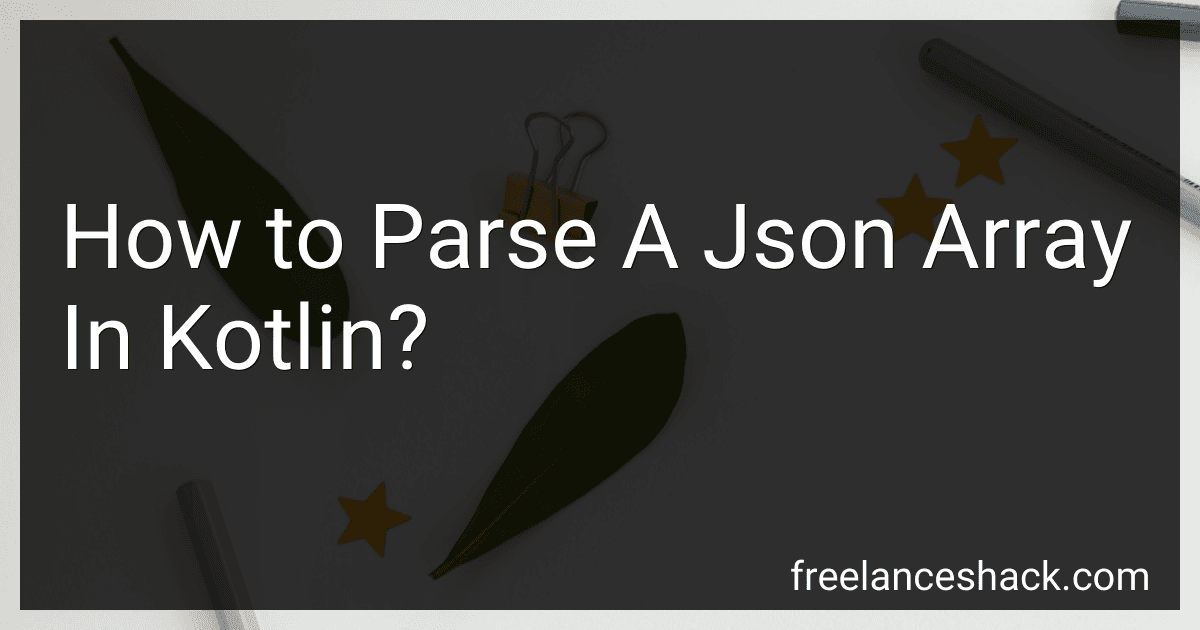Best JSON Parsing Tools for Kotlin to Buy in November 2025
To parse a JSON array in Kotlin, you can use the built-in library called "org.json" or a third-party library like Gson or Jackson. You can start by creating a JSON array object from the string representation of your JSON data. Once you have the JSON array object, you can iterate through its elements using a for loop or a forEach loop. You can then access and extract the values of each element using the appropriate methods provided by the library you are using. Remember to handle any potential exceptions that may occur during the parsing process.
How to ignore unknown properties when parsing a JSON array in Kotlin?
To ignore unknown properties when parsing a JSON array in Kotlin, you can use the JsonBuilder.ignoreUnknownKeys() function provided by the kotlinx.serialization library. Here's an example of how you can parse a JSON array and ignore unknown properties:
import kotlinx.serialization.decodeFromString import kotlinx.serialization.json.Json import kotlinx.serialization.json.JsonConfiguration import kotlinx.serialization.json.JsonParsingException
val jsonString = "[{\"name\": \"Alice\", \"age\": 30}, {\"name\": \"Bob\", \"age\": 25, \"gender\": \"male\"}]"
val json = Json(JsonConfiguration.Stable) json.ignoreUnknownKeys()
try { val people = json.decodeFromString<List>(jsonString) for (person in people) { println(person) } } catch (e: JsonParsingException) { println("Error parsing JSON: ${e.message}") }
@Serializable data class Person( val name: String, val age: Int )
In this example, we create a custom Json instance with ignoreUnknownKeys() enabled before decoding the JSON array into a list of Person objects. Any unknown properties in the JSON array will be ignored during parsing.
What is the role of TypeToken in parsing a JSON array using Gson in Kotlin?
TypeToken is a class provided by the Gson library that allows users to work around Java's type erasure during runtime. When you are parsing a JSON array using Gson in Kotlin, you can use TypeToken to specify the type of the data in the array. This is useful because Gson needs to know the specific type of the data in the JSON array in order to deserialize it correctly.
To use TypeToken in parsing a JSON array with Gson in Kotlin, you can create a TypeToken object that represents the type of the data you are expecting to parse. For example, if you have a JSON array of strings, you can create a TypeToken object like this:
val typeToken = object : TypeToken() {}
You can then use this TypeToken object when parsing the JSON array with Gson, like this:
val json = "["apple", "banana", "orange"]" val fruits: List = Gson().fromJson(json, typeToken.type)
By using TypeToken in this way, Gson is able to correctly deserialize the JSON array into a list of strings without losing any type information.
How to convert a JSON array to a List in Kotlin?
You can convert a JSON array to a List in Kotlin by using the Gson library, which is a popular library for working with JSON in Kotlin. Here is an example code snippet to demonstrate how to convert a JSON array to a List:
import com.google.gson.Gson
fun main() { // JSON array val jsonArray = "[1, 2, 3, 4, 5]"
// Convert JSON array to List
val list: List<Int> = Gson().fromJson(jsonArray, Array<Int>::class.java).toList()
// Print the converted List
println(list)
}
In this code snippet, we first define a JSON array as a string. We then use the Gson library to convert this JSON array to an array of Int, and then convert this array to a List using the toList() method. Finally, we print the converted List.
How to handle custom data types in a JSON array in Kotlin?
To handle custom data types in a JSON array in Kotlin, you can use the Gson library to serialize and deserialize your custom objects.
Here is an example that demonstrates how to handle custom data types in a JSON array using Gson:
- Add Gson library dependency to your project by including the following in your build.gradle file:
implementation 'com.google.code.gson:gson:2.8.6'
- Define your custom data class. For example, let's say you have a User class with name and age properties:
data class User(val name: String, val age: Int)
- Create a JSON array of your custom objects:
val users = listOf( User("Alice", 25), User("Bob", 30) )
- Serialize the list of custom objects to a JSON array using Gson:
val gson = Gson() val json = gson.toJson(users)
- Deserialize the JSON array back to a list of custom objects using Gson:
val usersFromJson: List = gson.fromJson(json, object : TypeToken<List>() {}.type)
Now you have successfully handled custom data types in a JSON array in Kotlin using Gson.



